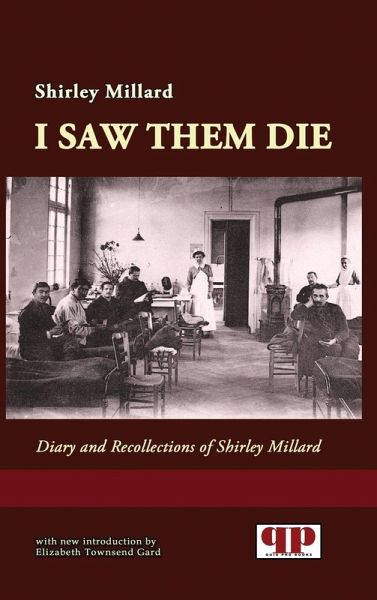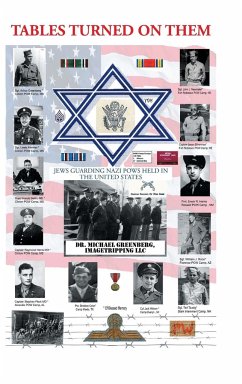
I Saw Them Die
Diary and Recollections of Shirley Millard
Versandkostenfrei!
Versandfertig in 1-2 Wochen
24,99 €
inkl. MwSt.

PAYBACK Punkte
12 °P sammeln!
Now in a library-quality hardcover edition with a modern, legible presentation, this is a true contemporary account of an American nurse's horrific - and sometimes bizarre - experiences while serving at a French battlefield hospital near Soissons during World War I. It has poignant layers which even the oft-naive author did not see. "As our camion drove through the château gate we could see that the grounds were covered with what looked like sleeping men." That is just her own introduction to the unit, housed in what was once a country estate, and soon she was standing hours on end treating f...
Now in a library-quality hardcover edition with a modern, legible presentation, this is a true contemporary account of an American nurse's horrific - and sometimes bizarre - experiences while serving at a French battlefield hospital near Soissons during World War I. It has poignant layers which even the oft-naive author did not see. "As our camion drove through the château gate we could see that the grounds were covered with what looked like sleeping men." That is just her own introduction to the unit, housed in what was once a country estate, and soon she was standing hours on end treating friend and enemy alike, facing harrowing hyperreality with aplomb. ¿ Shirley Millard is throughout a willing reporter of her fascinating perspective on war, youth, loss, and love - and always slapdash surgery and gallows camaraderie, inside a MASH unit before there was M*A*S*H. And before antibiotics, it is painfully clear. But she is also an unwitting reporter of so much more. The modern reader sees truths and wrongs that Shirley fails to experience herself, some at the time and too many upon rested reflection. The book compels attention not only on the level on which she wrote it, which would be enough to bring crashing home this forgotten war, but also on levels hidden to her. Either way the insights pierce through, as when the young French doctor sums up war: "La gloire, la gloire! Bah! C'est de la merde!" He is a hero too, but has his own incongruous scenes later, just in his smoking habits alone. ¿ This collection of diary entries and later flashbacks may be the second greatest personal account of World War I, behind that by the much more self-aware Erich Remarque (though readers here may find themselves drawn into the lack of awareness as much as the account itself). Yet this book seems to have been lost in time and the crush of later events. As TIME reviewed it in 1936, "Spare, simply written diary of a young, red-haired U.S. volunteer nurse in French hospitals near the front lines of 1918, in which romantic interludes heighten rather than ease a grisly atmosphere." It is that, but there is a lot more to it. And much of the writing is deeper than that, and certainly crisp and evocative in prose, even if some of the depth is more for the reader than the author. ¿ Includes penetrating new Foreword by Professor Elizabeth Townsend Gard, who studied the genre as part of her PhD research in History at UCLA. The original book, and its incongruities and twists revealed by Gard, will stick with the reader. Previously only available as a rare book, this work is now returned to its place in poignant history, and now published in a hardcover edition. ¿ POSSIBLE USES IN SCHOOLS: This book, though listed as targeted at college adults, will have as its principal audience the general reader and young adults. It would be an excellent, fairly brief book to assign to classes in High School and possibly Middle School. Although some of its scenes are stark and upsetting, and one would be cautioned to have YAs read it much as would be true of the candor of All Quiet on the Western Front, it has no other aspects which would make it inappropriate for minors and allows excellent discussions of war, class, race, nationalism, medicine, unsung women in war, foreshadowing and subtext, and many other themes that the author herself did not mean to raise. In other words, since the writer speaks on one level, and does not realize the other levels she touches, it would help to develop readers' critical skills to share their opinions about what she is missing in her own text. And in the process there will be no concern that the book would be inappropriate for YAs except that some of the medical and casualty moments are, of course, brutal. Also available in paperback and digital formats from Quid Pro Books.














